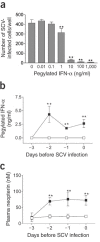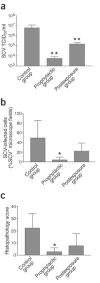Pegylated interferon-alpha protects type 1 pneumocytes against SARS coronavirus infection in macaques
- PMID: 14981511
- PMCID: PMC7095986
- DOI: 10.1038/nm1001
Pegylated interferon-alpha protects type 1 pneumocytes against SARS coronavirus infection in macaques
Abstract
The primary cause of severe acute respiratory syndrome (SARS) is a newly discovered coronavirus. Replication of this SARS coronavirus (SCV) occurs mainly in the lower respiratory tract, and causes diffuse alveolar damage. Lack of understanding of the pathogenesis of SARS has prevented the rational development of a therapy against this disease. Here we show extensive SCV antigen expression in type 1 pneumocytes of experimentally infected cynomolgus macaques (Macaca fascicularis) at 4 d postinfection (d.p.i.), indicating that this cell type is the primary target for SCV infection early in the disease, and explaining the subsequent pulmonary damage. We also show that prophylactic treatment of SCV-infected macaques with the antiviral agent pegylated interferon-alpha (IFN-alpha) significantly reduces viral replication and excretion, viral antigen expression by type 1 pneumocytes and pulmonary damage, compared with untreated macaques. Postexposure treatment with pegylated IFN-alpha yielded intermediate results. We therefore suggest that pegylated IFN-alpha protects type 1 pneumocytes from SCV infection, and should be considered a candidate drug for SARS therapy.
Conflict of interest statement
The authors declare no competing financial interests.
Figures




References
MeSH terms
Substances
LinkOut - more resources
Full Text Sources
Other Literature Sources
Miscellaneous

